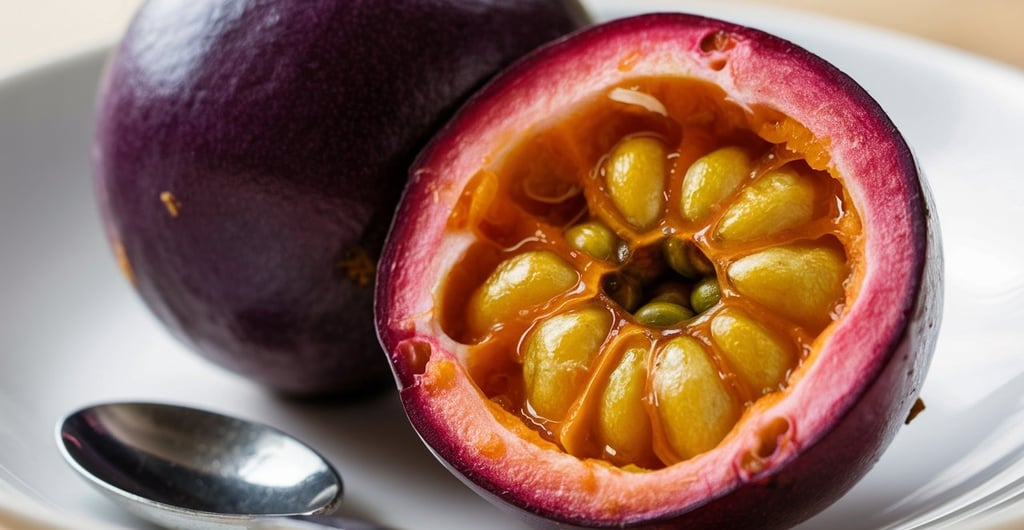The Health Benefits of Including Passion Fruit in Your Diet
Unlock the power of passion fruit! This delicious fruit isn't just bursting with flavor, it's packed with antioxidants, fiber, and vitamins to boost your heart health, immunity, and digestion. Discover how passion fruit can transform your diet and well-being in our blog post.
Isabella Ramirez
6/10/20246 min read


Passion fruit, with its vibrant purple or yellow exterior and unique, tangy flavor, is not just a treat for the taste buds but also a powerhouse of nutrients. This tropical fruit, scientifically known as Passiflora edulis, is packed with vitamins, minerals, antioxidants, and fiber, making it an excellent addition to a balanced diet. In this blog post, we'll explore the numerous health benefits of including passion fruit in your diet, backed by scientific research, and provide tips on how to incorporate this exotic fruit into your daily meals.
Introduction
Passion fruit is a tropical delight that hails from South America but has found its way into the kitchens and hearts of people around the world. Its distinctive flavor and aromatic scent make it a popular ingredient in beverages, desserts, and savory dishes. Beyond its culinary appeal, passion fruit boasts an impressive nutritional profile that offers numerous health benefits. From boosting immunity to supporting heart health, passion fruit is a versatile and nutritious addition to any diet.
Nutritional Profile of Passion Fruit
Before diving into the specific health benefits, let's take a look at what makes passion fruit so nutritionally rich. A single serving (approximately 100 grams) of passion fruit contains:
Calories: 97 kcal
Protein: 2.2 grams
Fat: 0.4 grams
Carbohydrates: 23 grams
Fiber: 10.4 grams
Vitamin C: 30 mg (50% of the Daily Value)
Vitamin A: 1274 IU (25% of the Daily Value)
Iron: 1.6 mg (9% of the Daily Value)
Potassium: 348 mg (10% of the Daily Value)
Magnesium: 29 mg (7% of the Daily Value)
Passion fruit is also rich in antioxidants, including polyphenols and carotenoids, which play a crucial role in protecting the body from oxidative stress.
Passion Fruit Skincare: DIY Masks and Treatments for Glowing Skin
Jumpstart Your Weight Loss Journey Today
The 10-Day Smoothie Diet: Lose Weight, Feel Amazing, and Boost Your Energy. This eBook is your guide to losing weight and improving your health with smoothies. Inside, you'll find:
- 10 day delicious and nutritious smoothie recipes that are packed with fruits, vegetables, and healthy fats to help you lose weight and feel your best.
- Tips and advice on how to make smoothies that taste great and help you reach your weight loss goals.


$0 for limited time
Health Benefits of Passion Fruit
1. Boosts Immunity
Passion fruit is a great source of vitamin C, an essential nutrient known for its immune-boosting properties. Vitamin C stimulates the production of white blood cells, which help protect the body against infections. Additionally, it acts as an antioxidant, neutralizing free radicals that can damage cells and contribute to chronic diseases.
2. Supports Digestive Health
One of the standout features of passion fruit is its high fiber content. With over 10 grams of fiber per serving, passion fruit promotes healthy digestion by adding bulk to the stool and preventing constipation. Fiber also acts as a prebiotic, feeding the beneficial bacteria in the gut, which are essential for a healthy digestive system.
3. Promotes Heart Health
The potassium and magnesium in passion fruit are vital for maintaining heart health. Potassium helps regulate blood pressure by balancing the effects of sodium in the body, reducing the risk of hypertension. Magnesium supports healthy heart function by aiding in the relaxation of blood vessels and maintaining a steady heart rhythm.
4. Enhances Skin Health
Passion fruit is rich in antioxidants such as vitamins A and C, which are crucial for maintaining healthy skin. Vitamin A promotes cell regeneration and repair, helping to keep the skin smooth and youthful. Vitamin C aids in collagen production, enhancing skin elasticity and reducing the appearance of wrinkles.
5. Supports Eye Health
The carotenoids in passion fruit, including beta-carotene, are converted into vitamin A in the body, which is essential for good vision. Vitamin A helps protect the cornea, improves night vision, and reduces the risk of age-related macular degeneration.
6. Provides Anti-Inflammatory Benefits
The antioxidants and phytochemicals in passion fruit have anti-inflammatory properties that can help reduce inflammation in the body. Chronic inflammation is linked to various health conditions, including heart disease, diabetes, and arthritis. By including passion fruit in your diet, you can help manage inflammation and support overall health.
7. Aids in Weight Management
Despite being rich in nutrients, passion fruit is low in calories and fat, making it an excellent addition to a weight management plan. The high fiber content helps you feel full longer, reducing the likelihood of overeating. Incorporating passion fruit into your meals can satisfy your sweet cravings in a healthy way.
How to Choose, Store, and Ripen the Perfect Passion Fruit
How to Incorporate Passion Fruit into Your Diet
Adding passion fruit to your diet is easy and can enhance the flavor and nutritional value of many dishes. Here are some ideas to get you started:
Smoothies: Blend passion fruit pulp with other fruits like mango, banana, and pineapple for a tropical smoothie.
Salads: Add fresh passion fruit to salads for a burst of flavor and color.
Desserts: Use passion fruit as a topping for yogurt, ice cream, or cheesecake.
Sauces and Dressings: Incorporate passion fruit juice into salad dressings or marinades for a tangy twist.
Beverages: Mix passion fruit juice with water or sparkling water for a refreshing drink, or use it in cocktails.
Delicious Passion Fruit Recipes to Try in 2024


Download Free High-Fiber Food List
FAQs about Passion Fruit
1. What is the best way to eat passion fruit?
The easiest way to enjoy passion fruit is to cut it in half and scoop out the pulp with a spoon. The seeds are edible and add a crunchy texture. You can also strain the pulp to remove the seeds if you prefer a smoother texture.
2. What does passion fruit taste like?
Passion fruit has a unique and complex flavor profile. It's often described as a tangy, sweet, and tropical combination. You'll find hints of citrus, melon, pineapple, and even kiwi in its taste. The balance between sweet and tart can vary depending on the ripeness of the fruit. A ripe passion fruit will be sweeter, while a less ripe one will be more tart.
3. Can I eat the seeds of passion fruit?
Yes, the seeds of passion fruit are edible and provide additional fiber and nutrients. They add a crunchy texture to the fruit and are often enjoyed along with the juicy pulp.
4. Is passion fruit suitable for people with diabetes?
Passion fruit has a low glycemic index and high fiber content, which can help regulate blood sugar levels. However, it's always best for individuals with diabetes to consult with a healthcare provider before making any significant changes to their diet.
5. Can passion fruit cause allergies?
While rare, some people may be allergic to passion fruit. Symptoms can include itching, swelling, and difficulty breathing. If you experience any adverse reactions after consuming passion fruit, seek medical attention immediately.
6. How do I store passion fruit?
Unripe passion fruit can be left at room temperature until it ripens, indicated by a slightly wrinkled skin. Once ripe, passion fruit can be stored in the refrigerator for up to a week. You can also freeze the pulp for longer storage.
7. What are the different types of passion fruit?
The two most common types of passion fruit are the purple variety (Passiflora edulis) and the yellow variety (Passiflora edulis f. flavicarpa). Both types have similar nutritional profiles and health benefits, although they may vary slightly in taste and sweetness.
8. Is passion fruit safe to eat during pregnancy?
Yes, passion fruit is generally safe to eat during pregnancy and can provide essential nutrients like vitamins A and C, fiber, and antioxidants. However, it's always best to consult with a healthcare provider for personalized dietary advice during pregnancy.
9. Can I use passion fruit in cooking and baking?
Absolutely! Passion fruit is a versatile ingredient that can be used in a variety of dishes, including smoothies, salads, desserts, sauces, and beverages. Its unique flavor adds a tropical twist to both sweet and savory recipes.
10. How can I tell if a passion fruit is ripe?
A ripe passion fruit will have a slightly wrinkled skin and feel heavy for its size. The color may vary depending on the variety, but generally, a ripe passion fruit will be vibrant and aromatic.
11. What are the health benefits of passion fruit leaves?
Passion fruit leaves are used in traditional medicine for their calming and sedative properties. They are often used to make tea that can help with anxiety, insomnia, and gastrointestinal issues. However, more scientific research is needed to fully understand their benefits and safety.
Conclusion
Passion fruit is a delicious and nutritious addition to any diet. Its impressive array of vitamins, minerals, and antioxidants provides numerous health benefits, from boosting immunity to promoting heart and digestive health. By incorporating passion fruit into your meals, you can enjoy its unique flavor while reaping its many health rewards. Ready to experience the health benefits of passion fruit? Start by adding this tropical delight to your grocery list and experimenting with the various ways to enjoy it. Your body and taste buds will thank you!
Supercharge Your Health with these 7 Smoothie Secrets

Empowering women to be healthy, happy, and beautiful.
Affiliate Disclosure: Some of the links on this site are affiliate links, which means that we may receive a small commission if you make a purchase through them. This is at no extra cost to you. This helps support this website and allows us to continue to create content like this.
©2026 FemmeJourney. All rights reserved.